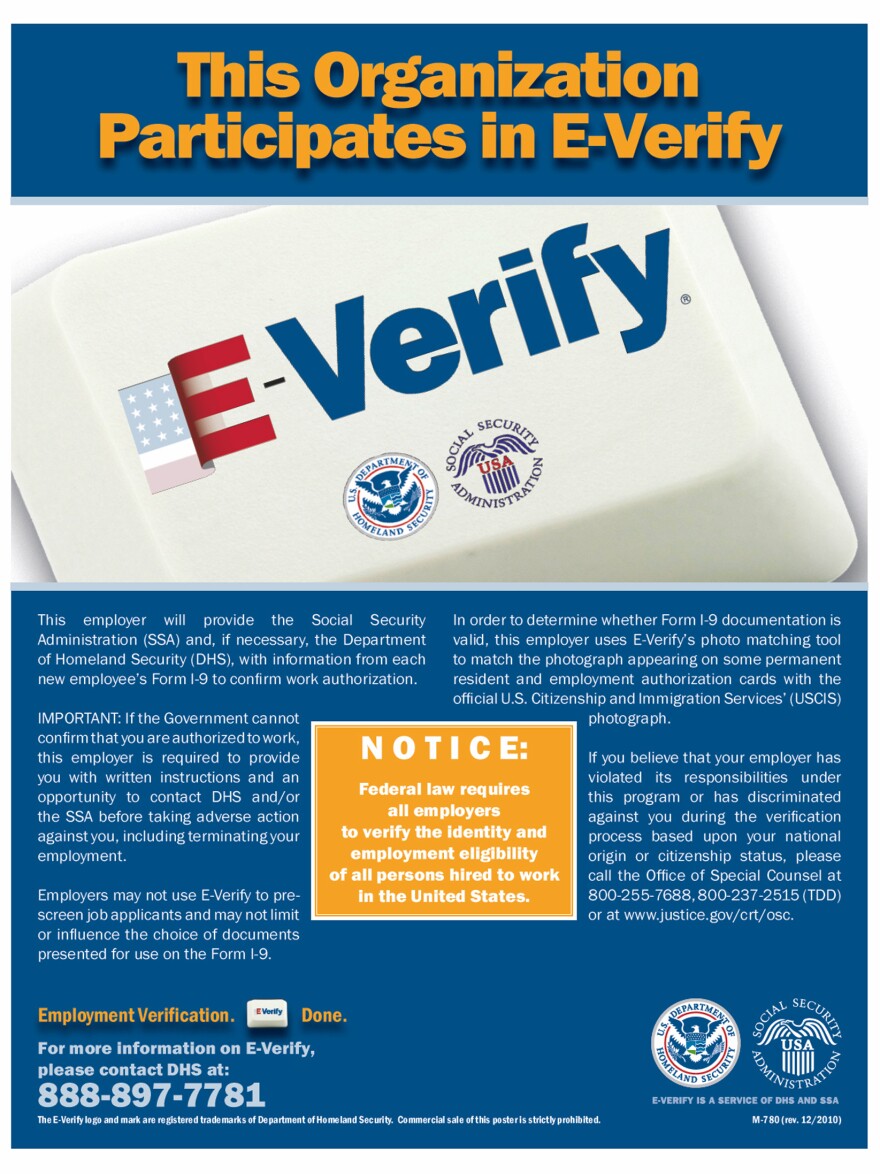Some employers around the nation have been using E-Verify to check the immigration status of employees for years. Operated by the Department of Homeland Security, the online system is designed to make it harder to hire unauthorized workers — and harder for those workers to find jobs.
While participation in the program has been voluntary since 1996, the immigration bill now in the Senate would make E-Verify mandatory.
In Arizona, the Tucson-based social services organization PPEP employs more than 500 workers. Susan Marsett, PPEP's human resources manager, uses E-Verify for every new hire.
She enters each hire's name, maiden name, if applicable, date of birth and Social Security number. After entering that information and more, Marsett goes to the next screen.
"I push 'continue' and it instantly would tell me this person is eligible to work, or this person has a tentative nonconfirmation," she explains.
Less Cumbersome, But Not Foolproof
Until a few years ago, E-Verify was difficult to use and even the government said it had problems with accuracy. Now, the Department of Homeland Security says the system confirms eligible employees more than 98 percent of the time. That's why Congress says E-Verify is ready for prime time.
It's still not foolproof; the ACLU opposes E-Verify, saying it's vulnerable to identity theft. Someone with a stolen Social Security number and a driver's license could game the system, for instance. That's why Jay Ahern, a former Customs and Border Protection commissioner, says E-Verify needs more safeguards.
"If you really want to be absolutely certain that somebody who's presenting themselves for employment verification [is who he says he is], you have to have the matching biometric with it as well, whether that be fingerprint or something else," Ahern says.
The Senate immigration bill requires employees to have documents with photos that match the E-Verify database. That could make it a cost-effective way to screen for unauthorized workers.
Doris Meissner, former commissioner of the Immigration and Naturalization Service, says mandatory E-Verify would free up resources that could be used to look for unscrupulous employers who hire workers off the books or pay substandard wages.
"Most employers do want to comply with the law," Meissner says. "They don't want to be vulnerable to law enforcement. And so those who are outliers then are a more isolated, smaller group and you can focus your enforcement on that."
A Deterrent Effect
In Tucson, PPEP's Marsett says E-Verify "works fine" for her organization. "I mean, it's an extra step," she says. "It takes extra time, and do we really like to do it? No. But we have to do it and so we do it."
As a federal contractor, PPEP is required to use E-Verify. Among its services, the organization gets government money to train farm workers and to provide affordable housing. PPEP also has to use it because it's in Arizona. The state made it mandatory for all employers in 2008. And back then, just knowing it was in use was apparently enough.
"Yes, when they first instituted E-Verify in Arizona, a lot of people were very scared," Marsett says. "Especially [because] we work with the farm-working community."
People left the state to avoid getting caught by E-Verify. Now, Marsett says, if the program says someone is not authorized to work, he doesn't have to be asked to leave.
"Typically, if somebody gets a nonconfirmation and it's a valid thing, they'll leave on their own," she says.
Which is exactly what Arizona legislators say they had in mind. The program saves the state from having to enforce the state law. In fact, in five years, only two Arizona businesses have been prosecuted under the state's law.
Twenty states have since passed laws requiring some kind of participation in E-Verify, and the Department of Homeland Security says more employers sign up every day. Even so, without a mandate from Congress, just 7 percent of all U.S. employers voluntarily use the program.
Copyright 2020 NPR. To see more, visit https://www.npr.org.



